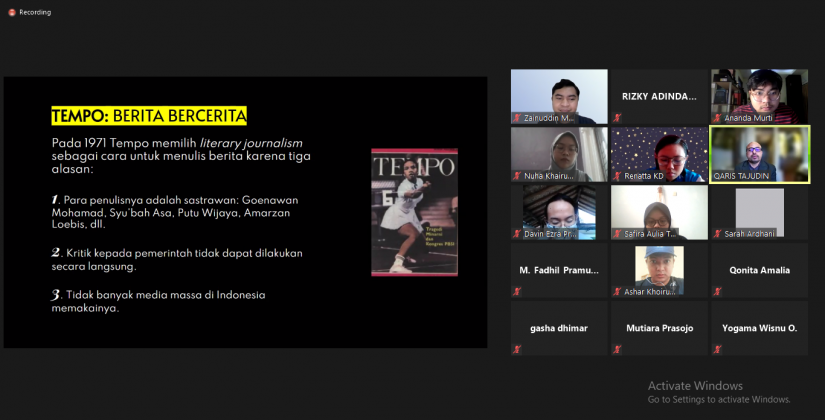
Yogyakarta, June 3rd 2021━Department of Communication Science (Dikom) of UGM held a practitioner lecture of the Literary Journalism course titled as Telling Stories in the Digital Age: Peeking from the Perspective of Literary Journalism (03/06). This practitioner lecture invited Qaris Tajudin, the Director of Tempo Institute, as the speaker and was attended by the students who specialize in Journalism.
Tempo is a media pioneer in the practice of literary journalism in Indonesia. At the beginning in 1971, the workers at Tempo were generally artists or writers. Tempo is also only produced weekly, so they accentuate the entertainment aspect of the news and put the speed aside. Literary journalism also becomes a solution to criticize the government which we can’t do directly.
Even so, Qaris said that Tempo’s literary journalism practice continues to undergo adjustments. Starting in 1998, online media began to develop and being critical was no longer unique. Tempo has also developed investigative reports, particularly in Tempo Magazine.
“In the past, people only had certain times to read, so weekly literary journalism was still eagerly awaited. Now we can read at any time, so the news must be exclusive and different from others,” Qaris said. According to him, investigative news does not only rely on writing skills that are easy to read, but also reliable reporting. This had shaken literary journalism at Tempo. In addition, the demand for fulfillment of search engine optimization (SEO) and keywords in online media was also a challenge at first.
However, Qaris said that investigative and longform (narrative) news now has its own market. It’s just that the author must be able to make an investigative report with a story that makes it easy for readers to understand it. This is where the opportunity for literary journalism re-emerges.
Qaris shares seven tips that must be considered in the production process of Tempo-style literary journalism, they are looking for story not news (story behind the news), focus on the details (the devil in the detail), presents the writing with a simple and short sentences (keep it short and simple), remove the first three paragraphs which are not important (three idiots), reducing adjectives and stressing the description (show don’t tell), reconstruction of the story (flashback), and can also present the witty elements (witty).
As the closing, Qaris said that throughout his twenty years of being a journalist, he felt that there was no bad field in journalism. Literary journalism is one way to make news related to various fields more interesting.
“Literary journalism is a very powerful tool for reporting anything,” Qaris said. When writing a story about an event or object, don’t just give an idea, but also tell the story behind it.
